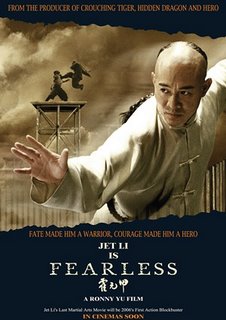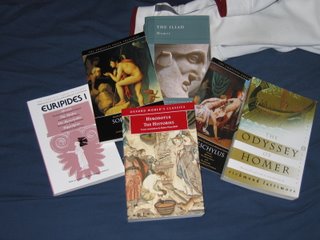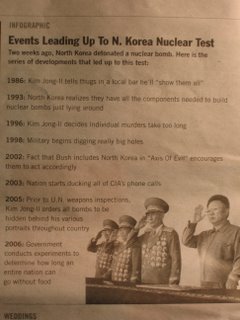
Going to see a wide-release movie in a theater (as opposed to some small indie film) isn’t usually something I consider blog-worthy, but for this film I’m going to make an exception. I went to see Fearless about a week ago, and was really very impressed with it; I felt the movie said a number of important things in a clever and subtle sort of way.
** Note ** This entire post is going to contain potential spoilers from this point on, so if you’re planning to see the movie and don’t want to know anything about it, don’t read any more until you’ve seen it. If you’ve already seen it, you’re set. If you’re not planning to see it … you should change your mind.
*s*I’ve been a Jet Li fan for quite some time, and watch most of the movies he brings out. Interestingly, I tend to like his earlier films done in China far better than the US release ones. The big exception to this is Hero, but that one was a lot more like Crouching Tiger so it had the feel of a Hong Kong/foreign cinema film. As a tangent, Jet Li was actually offered the role of Li Mu Bai (the swordsman) in Crouching Tiger, but he’d made a promise to his wife that he wouldn’t do a film while she was pregnant, and so he honored that promise and the role went to Chow Yun Fat instead. This was all for the best for two reasons: it gave me an enormous amount of respect for Jet Li, and Crouching Tiger was better because Chow Yun Fat was better for that role, mostly because he was taller. Jet Li would have been about the same height as Zhang Ziyi, which would have made the dynamic between them much different. So it all worked out for the better.
Anyways, so this movie is about the heavily-fictionalized life of a real Chinese hero named Huo Yanjia, who lived during the earlier part of the 20th century. He was a martial arts master who defended China’s national honor during a time when China was seen to be weakening in the eyes of foreign national powers, and thus went down in the annals of Chinese history with great fame and renown.
Several things about this movie were very cleverly done, and made it far more than just a martial arts film, but the most notable one was the way they set up the tension between the Chinese and the Japanese. There is an ancient historical rivalry between these two countries, and prior to the N. Korean missile test, current relations between the countries were not fantastic; there had been some ugly outbreaks of nationalistic violence in China a few months ago. So, it’s very easy in film for either side to use the other as a convenient “bad guy”. This film didn’t really do that. There are two main Japanese characters, a fighter named Tanaka who is the final challenger for Huo, and a politician who sort of “hatches the plot” to humiliate the Chinese by defeating their fighter. All along though, the two fighters have only the highest respect for each other, and there are some neat interactions between them. When it becomes apparent that Huo might very well win, the Japanese politician has Huo’s tea poisoned during his match with Tanaka. It becomes quickly apparent that Huo is in bad shape, and Tanaka offers to let them resume the match later, but Huo chooses to press on. In the end, Huo gets in a blow that could have been potentially lethal, but chooses to pull his punch at the last minute before succumbing to the poison. Tanaka realizes this and declares Huo the winner. On the way out of the arena, Tanaka is confronted by the Japanese politician, who is freaking out because the Chinese have won and undone his plan. But Tanaka, realizing it was he who poisoned Huo’s tea, slams him up against a wall and tells him that he is a disgrace to Japan.
So the movie didn’t choose the Japanese people or the Japanese nation as “the bad guy”, it chose a Japanese person. And it set him in counterpoint to another Japanese person who was upright and honorable to the end. found this an extremely clever way of putting the plot together.
I also liked it because the movie was really about Huo’s evolution & journey as a man, from being a reckless hothead to being able to see a bigger picture beyond himself. There was a particularly touching scene where he goes to his parent’s grave and expresses something very much like repentance. He says to his father, “I understand now why you held back the final blow. You are the true champion of Tianjan (the province Huo lived in)” It was really neat.
Also this was a great film for Jet Li to be able to do as his final “martial arts” film, in giving this nod towards a great Chinese national hero and being able to make the film about more than just fighting. And he really was perfect for it since Jet Li has himself been a Chinese national wushu champion many times over in the past; since he is an expert practitioner of the form, it lends a realism that boots the film considerably.
The only small complaint is that they did play quite loose with the historical details, most notably that in the film Huo’s only daughter dies, meaning he would have no descendants, but in real life he had a few sons & daughters and has grandchildren who are alive today. I felt this was a bit silly, but given all the things I liked about the film, I’m willing to overlook it.
It’s a great piece, especially if you like a good story and good action. I recommend it highly.
 ** Editor’s note: **
** Editor’s note: **










